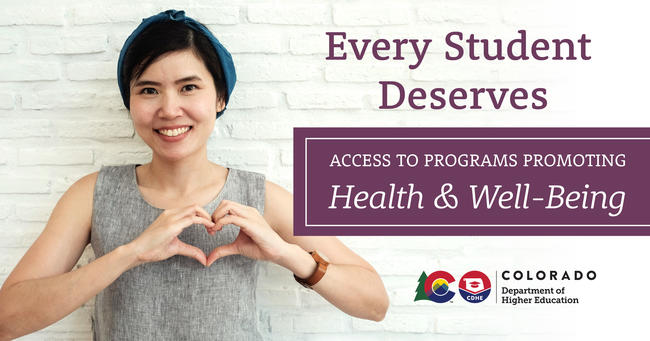
Colleges and universities have the responsibility to promote student success beyond just the classroom by providing students with basic needs such as food, housing, and financial stability. Though schools want the best for their students, many can be met by financial or capacity barriers when trying to implement programs. CDHE has created Hunger Free and Healthy Minds checklists to work with existing resources on college campuses and offer a variety of options to ensure that the needs of students are met while still working within available resources.
Food insecurity, defined as “the condition of limited or uncertain access to food,” impacts over 45% of college students in the United States. A student’s job, expenses, social network, and financial resources all impact their access to food. When students are concerned about where their next meal is coming from, food insecurity can lead to a lower GPA, poor mental health and a limited social life. The full scope of the number of students impacted is relatively unknown, leading to student food insecurity being an under recognized issue with limited infrastructure to address it.
There is no doubt that food security and ;mental health services are essential for students attending Colorado institutions of higher education and COVID-19 has only made those services more crucial. In fact, a recent Hanover Research study on fall enrollment and COVID-19’s impact on returning students shows mental health as one of the top three concerns in determining if they will return in the fall. Which is why it is so essential that our institutions prioritize services and programs that support the food security and mental health needs of students. The Colorado Department of Higher Education is excited to have partnered with Young Invincibles, Hunger Free Colorado, the National Mental Health Innovation Center, and our state agency partners to develop the “Hunger Free” and “Healthy Minds” campus checklist for institutions of higher education.
Below you can find resources to support the success of our students.
Healthy Minds Designated Schools
- Adams State University
- Aims Community College
- Arapahoe Community College
- Colorado College
- Colorado Mesa University
- Colorado Mountain College (all 11 campuses)
- Colorado School of Mines
- Colorado State University
- Colorado State University - Pueblo
- Community College of Aurora
- Fort Lewis College
- Front Range Community College
- Metropolitan State University of Denver
- Otero College
- Pueblo Community College
- University of Colorado Anschutz Medical Campus
- University of Colorado Boulder
- University of Colorado Colorado Springs
- University of Colorado Denver
- Western Colorado University
Hunger Free Designated Schools
- Adams State University
- Aims Community College
- Arapahoe Community College
- Colorado College
- Colorado Mesa University
- Colorado Mountain College (all 11 campuses)
- Colorado School of Mines
- Colorado State University
- Colorado State University - Pueblo
- Community College of Aurora
- Fort Lewis College
- Front Range Community College
- Metropolitan State University of Denver
- Otero College
- Pueblo Community College
- Regis University
- Technical College of the Rockies
- University of Colorado Anschutz Medical Campus
- University of Colorado Boulder
- University of Colorado Colorado Springs
- University of Colorado Denver
- University of Northern Colorado
- Western Colorado University
SNAP Benefits
- Apply for SNAP benefits:
- Supplemental Nutrition Assistance Program (SNAP) helps low-income households in Colorado purchase food. It provides a monthly benefit that helps families and individuals buy the food they need for good health.
WIC
- Apply for WIC:
- WIC is the Special Supplemental Nutrition Program for Women, Infants and Children.
Other Benefits
- Apply for other benefits:
- There are other benefit programs (like Medicaid) for which you may be eligible. To find out if you are eligible and apply, go to the Colorado PEAK website and create an account.
Other Resources
- News Release: Department releases Healthy Minds and Hunger Free Campus Checklists in an effort to erase hunger and address mental health needs (Feb. 24, 2021)
- Hunger Free Healthy Minds Release Event (Feb. 25, 2021)
- Young Invincibles
- Hunger Free Colorado
- Colorado Food Finder
- “Hunger Free” campus designation application (Application Opens Summer 2025)
- “Healthy Minds” campus designation application (Application Opens Summer 2025)
If you're an institution who has received a designation and would like support in communications materials, please email cdhe@dhe.state.co.us.
For specific questions or comments, please contact Dr. Gillian McKnight-Tutein, Chief Educational Equity Officer, Colorado Department of Higher Education at gillian.mcknighttutein@dhe.state.co.us.